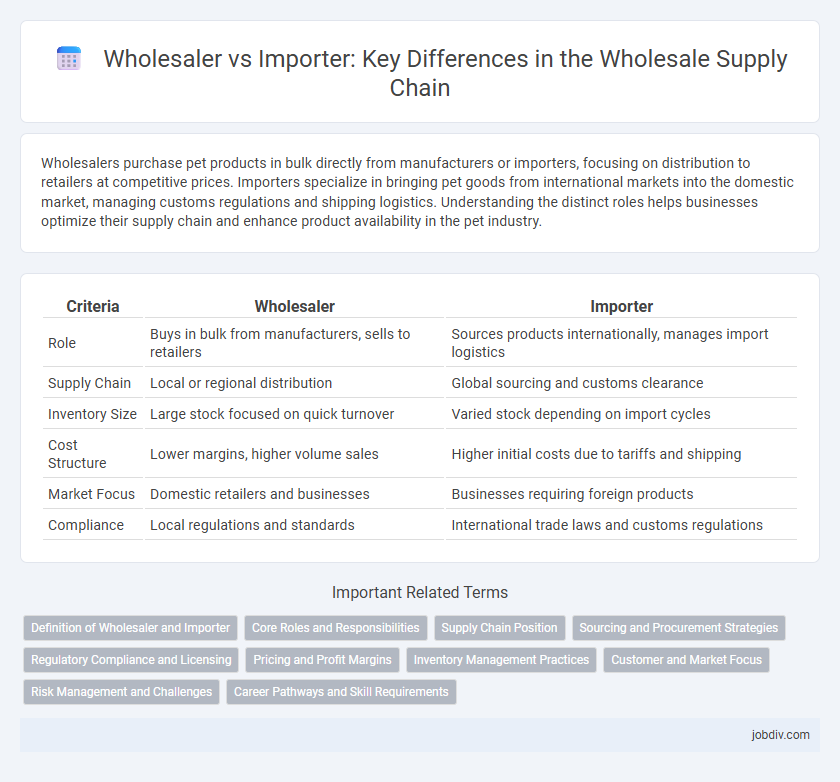Wholesalers purchase pet products in bulk directly from manufacturers or importers, focusing on distribution to retailers at competitive prices. Importers specialize in bringing pet goods from international markets into the domestic market, managing customs regulations and shipping logistics. Understanding the distinct roles helps businesses optimize their supply chain and enhance product availability in the pet industry.
Table of Comparison
| Criteria | Wholesaler | Importer |
|---|---|---|
| Role | Buys in bulk from manufacturers, sells to retailers | Sources products internationally, manages import logistics |
| Supply Chain | Local or regional distribution | Global sourcing and customs clearance |
| Inventory Size | Large stock focused on quick turnover | Varied stock depending on import cycles |
| Cost Structure | Lower margins, higher volume sales | Higher initial costs due to tariffs and shipping |
| Market Focus | Domestic retailers and businesses | Businesses requiring foreign products |
| Compliance | Local regulations and standards | International trade laws and customs regulations |
Definition of Wholesaler and Importer
A wholesaler is a business entity that purchases goods in bulk from manufacturers or importers and sells them in smaller quantities to retailers or other businesses, acting as an intermediary in the supply chain. An importer specializes in bringing products from foreign manufacturers into the domestic market, handling customs clearance, regulatory compliance, and logistics to ensure goods reach the wholesaler or retailer. Both roles are essential for efficient global trade, with wholesalers focusing on distribution and importers managing international product acquisition.
Core Roles and Responsibilities
Wholesalers primarily focus on buying bulk products from manufacturers or importers to distribute to retailers, managing inventory, logistics, and ensuring efficient product flow within the supply chain. Importers are responsible for sourcing goods from international markets, handling customs clearance, compliance with import regulations, and managing international shipping logistics. The core roles of wholesalers concentrate on domestic distribution and sales volume, while importers emphasize cross-border procurement and regulatory adherence.
Supply Chain Position
Wholesalers act as intermediaries between manufacturers and retailers, purchasing bulk goods to distribute within local markets, while importers specialize in sourcing products from international suppliers, managing customs, and facilitating cross-border logistics. In the supply chain, wholesalers primarily handle domestic distribution and inventory management, whereas importers focus on international procurement and compliance with import regulations. Both play critical roles in ensuring product availability, but importers initiate the supply chain flow from foreign markets, and wholesalers maintain the supply chain flow to retail outlets.
Sourcing and Procurement Strategies
Wholesalers primarily focus on sourcing products from multiple domestic and international manufacturers, leveraging established supplier networks to maintain inventory ready for rapid distribution. Importers specialize in procuring goods directly from foreign markets, managing international logistics, customs compliance, and currency exchange to optimize cost efficiency and lead times. Effective sourcing and procurement strategies for wholesalers emphasize volume discounts and supply chain reliability, while importers prioritize supplier relationships, regulatory knowledge, and cost control across cross-border transactions.
Regulatory Compliance and Licensing
Wholesalers must obtain appropriate business licenses and comply with local and federal regulations governing product distribution, ensuring adherence to tax, safety, and labeling laws specific to their trade. Importers face additional regulatory compliance requirements, including customs documentation, import tariffs, and adherence to international trade agreements and import-specific certifications. Both wholesalers and importers must maintain updated licenses and rigorous record-keeping to avoid legal penalties and ensure smooth operations in the supply chain.
Pricing and Profit Margins
Wholesalers purchase large quantities of goods from manufacturers or importers at discounted rates, allowing them to set competitive prices while maintaining healthy profit margins through volume sales. Importers often face higher initial costs due to shipping, customs duties, and compliance fees, which can slightly reduce profit margins but offer unique product access and exclusive distribution rights. Pricing strategies for wholesalers emphasize bulk sales and turnover efficiency, whereas importers focus on price adjustments to cover logistics and regulatory expenses while maximizing returns.
Inventory Management Practices
Wholesalers typically manage large volumes of diverse inventory to meet immediate demand from retailers, employing just-in-time (JIT) techniques and real-time stock tracking systems to optimize turnover rates. Importers focus on bulk procurement and long lead times, requiring advanced forecasting models and warehouse optimization to balance storage costs with supply chain delays. Both entities prioritize accurate inventory data integration across platforms to minimize stockouts and overstock situations within global supply networks.
Customer and Market Focus
Wholesalers primarily target domestic retailers and businesses, offering bulk quantities of products to streamline local distribution channels. Importers focus on bringing international goods into the domestic market, catering to niche customer demands and expanding product variety for retailers and consumers. The market focus of wholesalers is often volume-driven within established supply chains, while importers emphasize sourcing unique or specialty items to meet evolving customer preferences.
Risk Management and Challenges
Wholesalers face risks like inventory obsolescence and demand fluctuations, requiring robust risk management strategies such as diversified supplier bases and efficient stock control systems. Importers encounter challenges including customs regulations, currency fluctuations, and longer supply chains that increase lead times and potential disruptions. Effective risk mitigation for importers often involves compliance expertise, hedging financial exposure, and maintaining strong logistics partnerships.
Career Pathways and Skill Requirements
Wholesalers typically develop strong expertise in sales, inventory management, and customer relationship skills, making careers in supply chain coordination and commercial sales management accessible. Importers require knowledge of international trade regulations, customs compliance, and logistics, emphasizing skills in global market analysis and risk management. Both career pathways benefit from proficiency in negotiation, market research, and strategic planning to optimize supply chain efficiency and business growth.
Wholesaler vs Importer Infographic

 jobdiv.com
jobdiv.com